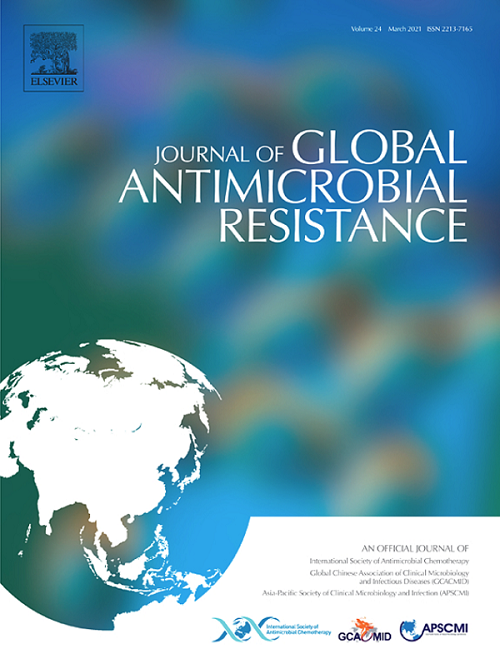Genomic insights into a novel ST17306 Escherichia coli Isolate carrying tet(X4) from an infant with bronchopneumonia in China
IF 3.2
3区 医学
Q2 INFECTIOUS DISEASES
引用次数: 0
Abstract
Objectives
Despite the widespread occurrence of tet(X4)-mediated tigecycline resistance in Escherichia coli from animal and environmental sources, its presence in human clinical isolates remains rare. In this study, we report the first whole-genome sequence of a E. coli isolate harboring tet(X4) and belonging to a novel sequence type, recovered from an infant in China.
Methods
The complete genome of E. coli Q65 was sequenced using a combination of Illumina NovaSeq 6000 and Oxford Nanopore MinION sequencing platforms. Functional annotation was conducted using the NCBI Prokaryotic Genome Annotation Pipeline (PGAP), and genomic features were further analyzed with a range of bioinformatics tools.
Results
The genome of E. coli strain Q65 is 5 442 192 bp in length and encodes 5089 proteins. Strain Q65 was classified as sequence type ST17306, a novel member of the ST69 clonal complex, and was assigned the serotype O17:H18. Q65 exhibited multidrug resistance, carrying 14 antimicrobial resistance genes, including tet(X4). The tet(X4) gene was located on a 192 048 bp hybrid plasmid belonging to the IncFIA(HI1)/IncHI1B(R27)/IncHI1A replicon types. A search of the NCBI database revealed similar tet(X4)-carrying hybrid plasmids present in various Enterobacteriaceae species, suggesting that such plasmids may play a key role in mediating the horizontal transfer of tet(X4).
Conclusion
This study presents the first complete genome sequence of a tet(X4)-positive, multidrug-resistant E. coli strain belonging to the novel sequence type ST17306, isolated from a Chinese infant with bronchopneumonia. Continuous global surveillance of the dissemination of tet(X4)-harboring strains is crucial to monitor and control the potential public health threat.
中国婴幼儿支气管肺炎携带tet(X4)的新型ST17306大肠杆菌分离物的基因组学研究
目的:尽管tet(X4)介导的替加环素耐药性在动物和环境来源的大肠杆菌中广泛存在,但其在人类临床分离株中的存在仍然罕见。在这项研究中,我们报道了从中国一名婴儿身上发现的携带tet(X4)的大肠杆菌分离物的第一个全基因组序列,该分离物属于一种新的序列类型。方法:采用Illumina NovaSeq 6000和Oxford Nanopore MinION测序平台对大肠杆菌Q65全基因组进行测序。使用NCBI原核基因组注释管道(PGAP)进行功能注释,并使用一系列生物信息学工具进一步分析基因组特征。结果:大肠杆菌Q65的基因组长度为5,442,192 bp,编码5,089个蛋白。菌株Q65为ST69克隆复合体的新成员,序列型为ST17306,血清型为O17:H18。Q65表现为多药耐药,携带包括tet(X4)在内的14个耐药基因。tet(X4)基因位于一个192,048 bp的杂交质粒上,属于IncFIA(HI1)/IncHI1B(R27)/IncHI1A复制子类型。对NCBI数据库的搜索发现,在各种肠杆菌科物种中存在类似的携带tet(X4)的杂交质粒,这表明这种质粒可能在介导tet(X4)的水平转移中起关键作用。结论:本研究首次获得了一株tet(X4)阳性、耐多药大肠杆菌菌株的全基因组序列,该菌株属于ST17306新序列型,分离自中国婴幼儿支气管肺炎。持续监测携带tet(X4)菌株的全球传播对于监测和控制潜在的公共卫生威胁至关重要。
本文章由计算机程序翻译,如有差异,请以英文原文为准。
求助全文
约1分钟内获得全文
求助全文
来源期刊

Journal of global antimicrobial resistance
INFECTIOUS DISEASES-PHARMACOLOGY & PHARMACY
CiteScore
8.70
自引率
2.20%
发文量
285
审稿时长
34 weeks
期刊介绍:
The Journal of Global Antimicrobial Resistance (JGAR) is a quarterly online journal run by an international Editorial Board that focuses on the global spread of antibiotic-resistant microbes.
JGAR is a dedicated journal for all professionals working in research, health care, the environment and animal infection control, aiming to track the resistance threat worldwide and provides a single voice devoted to antimicrobial resistance (AMR).
Featuring peer-reviewed and up to date research articles, reviews, short notes and hot topics JGAR covers the key topics related to antibacterial, antiviral, antifungal and antiparasitic resistance.
 求助内容:
求助内容: 应助结果提醒方式:
应助结果提醒方式:


